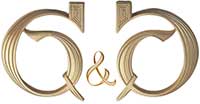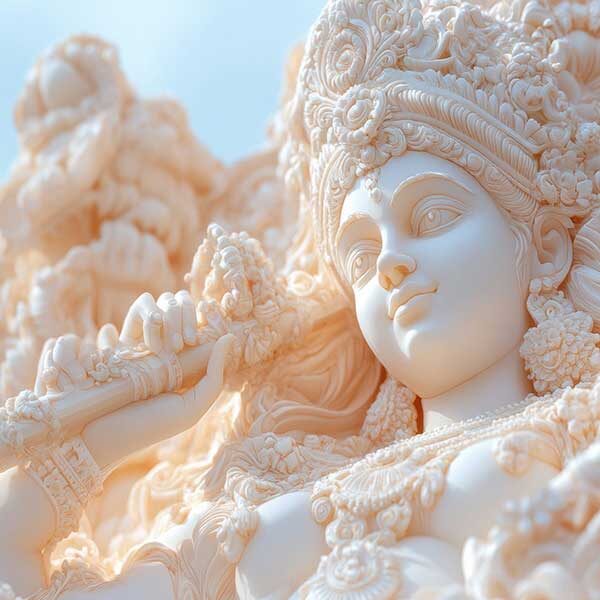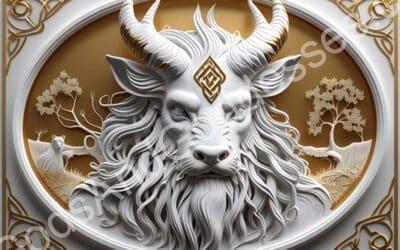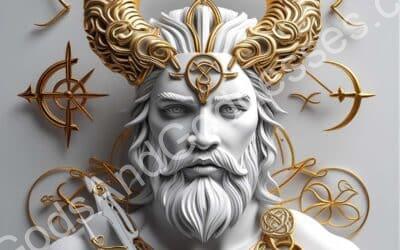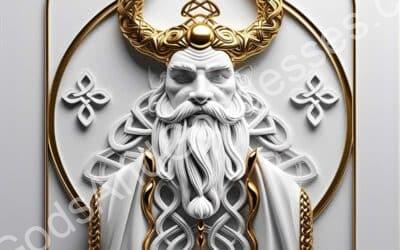Receive Our Newsletter
Resources and reminders to
live your Divine Destiny™
Introduction: Why Celtic Gods Matter
The Celtic gods are among the most mysterious deities in world mythology; unlike the Olympians or Norse gods, their stories were preserved less through written texts and more through oral tradition, folklore, and scattered medieval manuscripts. Yet what survives paints a vivid picture of gods who ruled over nature, war, fertility, and sovereignty, deeply tied to the land and its people.
At GodsAndGoddesses.com, we explore the Celtic gods as part of the broader world of mythology, gods, and goddesses. From the Dagda, the “Good God” of abundance, to Lugh, the many-skilled warrior, and Cernunnos, the horned god of nature, Celtic deities reflect both the mystical and the practical—the cycles of harvest, the power of battle, and the sacredness of earth and sky.
“For the Celts, the gods were not distant—they were the breath of the land, the pulse of rivers, and the spirit of the tribe.”
Key Takeaways About Celtic Gods
-
Celtic gods embody sovereignty, fertility, nature, skill, and war.
-
Their myths are rooted in local landscapes—hills, rivers, forests, and battlefields.
-
Many belong to the Tuatha Dé Danann, a divine race of Irish myth.
-
Famous figures include The Dagda, Lugh, and Cernunnos, but many other local gods once shaped tribes and regions.
-
Their influence continues today in Celtic festivals, folklore, and modern spiritual revivals.
Explore Celtic God Stories
-
The Dagda: Celtic Father God of Wisdom, Strength, and Abundance → The “Good God” of plenty and sovereignty.
-
Lugh: Celtic God of Sun, War, and Many Skills → A radiant warrior tied to harvest and craft.
-
Cernunnos: Celtic Horned God of Nature, Animals, and Fertility → Lord of the wild and cycles of life.
The Celtic Pantheon
Unlike the structured pantheons of Greece or Rome, the Celtic pantheon was fluid. Gods varied across Ireland, Scotland, Wales, Gaul, and beyond. Some were local deities tied to rivers, tribes, or regions, while others—like Danu or The Dagda—were remembered across traditions.
They were often associated with:
-
Nature and fertility – forests, rivers, and animals.
-
Sovereignty and kingship – divine right to rule, often mediated by a goddess.
-
War and protection – fierce defenders of tribes.
-
Art and skill – inspiration for poets, craftsmen, and warriors.
External resource: World History Encyclopedia – Celtic Mythology.
Major Celtic Gods
The Dagda: The Good God
-
Father figure and chief of the Tuatha Dé Danann.
-
Domains: strength, fertility, wisdom.
-
Possessed a magical cauldron of plenty and a club that could kill or revive.
Lugh: The Shining One
-
Master of many skills—craft, music, war, and leadership.
-
Associated with the harvest festival Lughnasadh.
-
Wielded an unstoppable spear in battle.
Cernunnos: The Horned God
-
Depicted with antlers, seated cross-legged, surrounded by animals.
-
Domains: fertility, animals, wild nature.
-
Symbol of cycles of life, death, and renewal.
Other Notable Celtic Gods
-
Belenus – Sun god of light and healing.
-
Nuada – King with the silver hand.
-
Goibniu – Smith god, provider of weapons and feasts of immortality.
Symbols of Celtic Gods
Celtic gods were tied to powerful symbols and sacred objects:
-
Cauldrons → abundance, rebirth, divine wisdom.
-
Spears & Swords → power, kingship, and battle.
-
Animals → stags, boars, ravens, and horses.
-
Antlers → fertility and the wild, linked to Cernunnos.
See also: Mythological Symbols.
Celtic Gods and the Tuatha Dé Danann
Much of what we know comes from Irish mythology and the Tuatha Dé Danann, a divine race who brought magic, wisdom, and culture to Ireland. Recorded by monks, their stories mix myth with legend.
The Tuatha fought epic battles against the Fomorians (forces of chaos), and their gods—The Dagda, Lugh, Nuada—embodied skill, sovereignty, and abundance.
Celtic Gods in Modern Culture
-
Neo-Pagan and Druidic Traditions – rituals honoring Brigid, The Dagda, and Cernunnos.
-
Literature and Fantasy – Tolkien, Yeats, and modern writers drew on Celtic myth.
-
Festivals – Lughnasadh, Samhain, and Imbolc celebrate cycles tied to gods.
External resource: Britannica – Celtic Religion.
Frequently Asked Questions
Who is the most important Celtic god?
The Dagda is often considered the chief of the gods, though Lugh and Cernunnos are also central figures.
Were the Celts polytheistic?
Yes. They worshiped many gods, often tied to nature, fertility, and war.
Do Celtic gods still influence modern spirituality?
Yes. Celtic deities are honored in modern paganism, druidry, and cultural revivals.

Conclusion: The Legacy of Celtic Gods
The Celtic gods were not distant rulers but intimate forces of nature, sovereignty, and skill. They embodied the cycles of creation, battle, and renewal—reminding us that divinity lived in rivers, forests, and hills.
From The Dagda’s cauldron to Lugh’s radiant spear and Cernunnos’s wild antlers, the Celtic pantheon remains one of the most mysterious yet inspiring in world mythology.
Explore further:
“The Celtic gods still whisper in rivers, forests, and fires—wherever life and story meet.”
Posts About Celtic Gods
Cernunnos: Celtic Horned God of Nature, Animals, and Fertility
Cernunnos Celtic Horned God Among the Celtic Gods, few figures are as mysterious as Cernunnos, the Horned God of nature, animals, and fertility. Recognized by his antlers and his meditative presence...
Lugh: Celtic God of Sun, War, and Many Skills
Lugh Celtic God Among the Celtic Gods, none shines as brightly as Lugh (also spelled Lug, Lugus, or Lú), a radiant deity known as a warrior, craftsman, and king. Celebrated as the “god of many...
The Dagda: Celtic Father God of Wisdom, Strength, and Abundance
Dagda Celtic Father God Known as the “Good God,” the Dagda was a father figure, warrior, and master of wisdom, fertility, and abundance. Among the Celtic Gods, none looms larger—literally or...
- Odin God Story - August 24, 2025
- The Story of Ra: Egyptian Sun God and Creator - August 24, 2025
- Kraken: Mythological Sea Monster of the Deep - August 24, 2025
